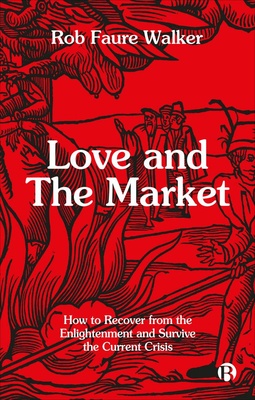A raven once used me to save a crow. I was out for a run when it flew alongside me, catching my attention with a loud “craw”. It then led me to the crow that had become tangled onto a barbed wire fence by some discarded string, swooping past the crow and touching it and then me with its outstretched wing. The crow that the raven led me to would have died had I not carefully used a sharp flint to cut away the rubbish that was digging into its feet and snagging it to the fence.
As well as being a parable about properly disposing of our waste, this points towards a world that is more caring, complex and conscious than our post-Enlightenment scientific rationality and Darwin’s ’survival of the fittest‘ tells us.
The raven was using me to rescue a bird of another species, a bird that occupies the same ecological niche as the raven and that Darwin’s theory tells us it should be competing with. But Darwin’s concept is only part of the story. Published in 1902, Mutual Aid: A Factor of Evolution is Russian naturalist Peter Kropotkin’s account of the interdependence of the living world. He specifically notes the propensity of different species to care for one another and his observations are the foundation of anarchist theory and of the left more generally.
Teasing out the political context in which Darwin and Kropotkin were promoting their theories of evolution, we see that the foregrounding of either has more to do with the politics of the time than the reality of relations in the natural world. In reality, both the ‘survival of the fittest’ and ‘mutual aid’ are at play in the natural world, something that has started to be more widely appreciated as our understanding of the interdependence of the natural world has developed through the emergence of ecological thinking in the last half century.
The raven had recognised the plight of the crow and that it could use me to rescue it. This was a transcendent experience for me; it took me beyond my human consciousness and into a more complex world. But we don’t need ravens to experience this transcendence. We are doing it all the time. As I type these words, I recognise you, and you recognise me as you read them. Within the philosophy of critical realism, this is known as ‘transcendental identification in consciousness’ and it happens whenever you have a conversation with another person (or raven). Expanding on this, the act of recognising anything else in the whole universe is a form of transcendence. This recognition is inseparable from care and is the manifestation of Love.
I’ve capitalised ‘Love’ as I want it to stand out from the multiple and contradictory definitions that we find across philosophical texts. Love is not just a feeling or an act; it is a foundational (meta)reality within which we live. Through our actions we can align ourselves with it. While Love might be beyond our direct experience, aligning with it brings us into what psychologists refer to as ‘flow’ and is related to the practice of karma in Hinduism, whereby things start going right for us as we make the right choices. It is also aligned with the practice of scientific enquiry.
Enlightenment principles of scientific enquiry presume that the world is ever more complex than we can perceive. This is the rationale for continued scientific enquiry – for ‘progress’. But these principles tend to be turned on their head in our modern world. Rather than appreciating the infinite complexity of the universe, the practice of science today often reduces the world to what has been scientifically proven. For example, your medical doctor will tend to prescribe antidepressants that have been tested by randomised controlled trials (RCTs), rather than explore changes in habits that we know affect mood but that have not been experimentally proven. The application of RCTs to education have had disastrous impacts on the infinitely complex relations between teachers and pupils in recent years. And the continued financialisaton of our economy has further reduced our beautiful world to numbers on spreadsheets, leaving our rivers full of sewage, our soils denuded of life, and global crises of mental and physical health. In short, the modern world is at odds with Love.
Recognising that Love is greater than the market economy and our alienated modern selves leads us to slow down and pay attention to the world. This allows us to see that other people, animals, plants and the land are complex and conscious, and demand our recognition and care. This takes us beyond the singular pursuit of scientific enquiry and economic gain to a humbler and more passive approach of wandering through and wondering about the world. The raven showed me how to care for the crow and the land even provided the sharp stone tool to do so. When we slow down and pay attention, solutions to problems that we didn’t know existed are presented to us.
Rob Faure Walker is Research England Fellow at University College London. He helps others heal from the alienation of modernity via Integrated Mindscapes.
 Love and the Market by Rob Faure Walker is available on the Bristol University Press website. Order here for £27.99.
Love and the Market by Rob Faure Walker is available on the Bristol University Press website. Order here for £27.99.
Bristol University Press/Policy Press newsletter subscribers receive a 25% discount – sign up here.
Follow Transforming Society so we can let you know when new articles publish.
The views and opinions expressed on this blog site are solely those of the original blog post authors and other contributors. These views and opinions do not necessarily represent those of the Policy Press and/or any/all contributors to this site.
Image credit: Shaira Dela Peña via Unsplash


